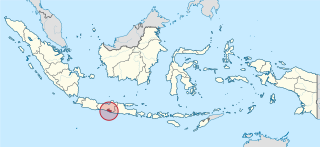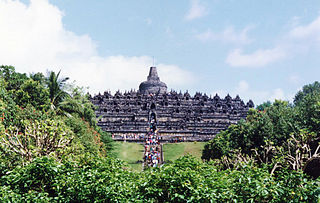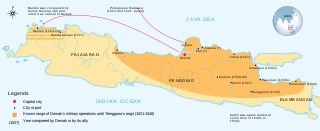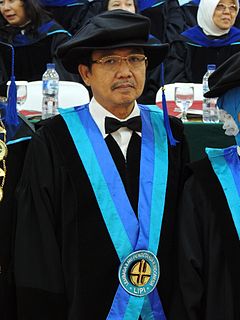Related Research Articles

The Special Region of Yogyakarta is a provincial-level autonomous region of Indonesia in southern Java. It is bordered by the Indian Ocean to the south, as well as sharing all the land borders to the province of Central Java. Ruled by the Yogyakarta Sultanate, the region is the only officially recognized monarchy within the government of Indonesia. The city of Yogyakarta is a popular tourist destination and cultural center of the region.

The Javanese people are a Southeast Asian ethnic group native to the Indonesian island of Java. With approximately 100 million people, they form the largest ethnic group in Indonesia. They are predominantly located in the central to eastern parts of the island. There are also significant numbers of people of Javanese descent in most provinces of Indonesia, Malaysia, Singapore, Suriname, Egypt, Saudi Arabia, Yemen and the Netherlands.

Prince Diponegoro, also known as Dipanegara, was a Javanese prince who opposed the Dutch colonial rule. The eldest son of the Yogyakartan Sultan Hamengkubuwono III, he played an important role in the Java War between 1825 and 1830. After his defeat and capture, he was exiled to Makassar, where he died, 69 years old.

The Madurese are an ethnic group originally from the island of Madura now found in many parts of Indonesia, where they are the third-largest ethnic group by population. Common to most Madurese throughout the archipelago is the Islamic religion and the use of the Madurese language.

The Wali Songo are revered saints of Islam in Indonesia, especially on the island of Java, because of their historic role in the Spread of Islam in Indonesia. The word wali is Arabic for "trusted one" or "friend of God", while the word sanga is Javanese for group of monks or the number nine. Thus, the term is often translated as "Sangha of saints".

The history of arrival and spread of Islam in Indonesia is unclear. One theory states it arrived directly from Arabia before the 9th century, while another credits Sufi merchants and preachers for bringing Islam to Indonesian islands in the 12th or 13th century either from Gujarat in India or directly from the Middle East. Before the arrival of Islam, the predominant religions in Indonesia were Hinduism and Buddhism.

The Demak Sultanate was a Javanese Muslim state located on Java's north coast in Indonesia, at the site of the present-day city of Demak. A port fief to the Hindu-Buddhist Majapahit kingdom thought to have been founded in the last quarter of the 15th century, it was influenced by Islam brought by Muslim traders from China, Gujarat, Arabia and also Islamic kingdoms in the region, such as Samudra Pasai, Malacca and Bani (Muslim) Champa. The sultanate was the first Muslim state in Java, and once dominated most of the northern coast of Java and southern Sumatra.
Sunan Bonang was one of the Wali Songo, along with his father Sunan Ampel and his brother Sunan Drajat.
Sunan Ampel was one of the Javanese nine revered saints Wali Songo, credited for the spread Islam in Java. According to local history around Demak the mosque of Demak Masjid Agung Demak was built by Sunan Ampel in 1479 CE, but other source credited the construction of the mosque to Sunan Kalijaga.

KH. Hasyim Asy'ari was an Indonesian ulama, National Hero and founder of Nahdlatul Ulama.

The Sultanate of Cirebon was an Islamic sultanate in West Java founded in the 15th century. It is said to have been founded by Sunan Gunungjati, marked by his letter proclaiming Cirebon's independence from Pajajaran in 1482, although the settlement and the polity had been established earlier in 1445. Sunan Gunungjati also established the Sultanate of Banten. It was one of the earliest Islamic states established in Java, along with the Sultanate of Demak.
Sunan Drajat was born in 1470 CE. He was one of the Wali Songo or "nine Saints", along with his father Sunan Ampel and his brother Sunan Bonang.

Endang Turmudi is a sociologist and Research Professor from Indonesia. He is a senior researcher at the Indonesian Institute of Sciences (LIPI) in Jakarta and was head for its Society and Culture Research Center (PPKK). Turmudi was inaugurated as LIPI's 114th research professor in December 2014, with research specialization in sociology.

Kiai Haji Zainal Mustafa, born Hudaemi, and also known as Zainal Mustofa, was an Indonesian ulama and National Hero of Indonesia. He founded the Pesantren Sukamanah when he was 20. He was awarded the title of National Hero in 1972.

Cangkuang is a small 8th-century Shivaist candi located in Kampung Pulo village, Cangkuang, Kecamatan Leles, Garut Regency, West Java, Indonesia. The temple is one of very few Hindu-Buddhist temples discovered in West Java, other temples include Batujaya and Bojongmenje temple.
Zainal Abidin was the eighteenth ruler of the Ternate kingdom in Maluku in modern-day Indonesia. His life is only described in sources dating from the 16th century or later. According to these sources he was the first ruler of Ternate to use the title Sultan rather than Kolano, or king, and enacted a number of changes in the government, based on Islamic Law, technically transforming Ternate into an Islamic kingdom.
Prabhu Natha Girindrawardhana Dyah Ranawijaya was the ruler of the Majapahit Empire between 1474 and 1498. He is referred in a Jiyu inscription as Sri Wilwatikta Jenggala Kediri, which means ruler of Majapahit, Janggala and Kediri, and as Pa Bu Ta La in Chinese literature.
Adwayawarman was the father of King Adityawarman of Malayapura kingdom as mentioned in the Kuburajo I Inscription. His alias name was Adwayadwaja, as he was called in the Bukit Gombak Inscription.
Indonesian Muslim Council was the Muslim wing of the Indonesian Democratic Party. The movement was formed by Suryadi, the third chairman of PDI, as a way to accommodate santris and ulama in the party.

KHR. As’ad Syamsul Arifin was an Indonesian ulama and co-founder of Nahdatul Ulama. In 2016, he was declared a National Hero of Indonesia.
References
- 1 2 3 Wahid Institute, reference card Archived 2013-04-16 at archive.today
- 1 2 3 Prince Claus Fund, profile [ permanent dead link ]